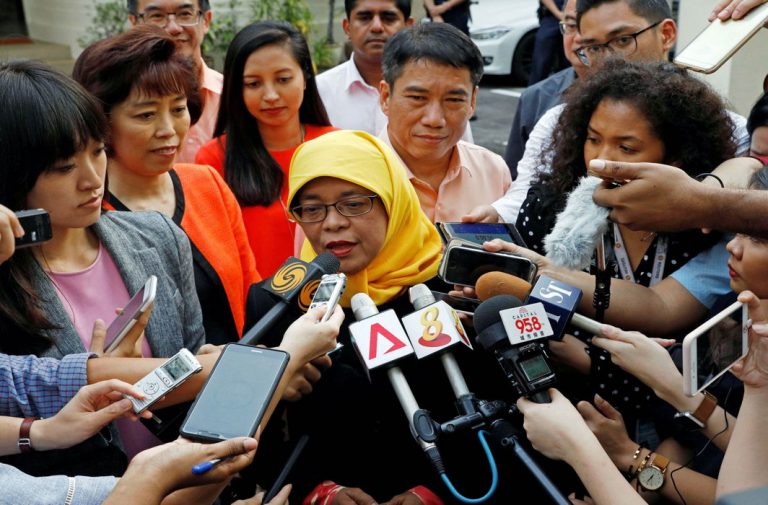
Above: Former speaker of Singapore’s Parliament Halimah Yacob speaks to the media. POFMA seeks to shackle the already controlled press/Photo: UNI
A new, stringent law which gives the Singapore government extensive powers to police online media and free speech has drawn flak and is similar to the one enacted by Malaysia earlier
By Asif Ullah Khan
In April, during a joint press conference, Malaysian Prime Minister Dr Mahathir Mohamad warned his Singapore counterpart, Lee Hsien Loong, about a proposed bill against fake news. He said such laws are widely abused by the government to prevent people from airing their views. Mahathir should know what he is talking about; he too faced a similar situation when his predecessor, Najib Razak, just a few days before elections, rammed through Parliament an anti-fake news law to counter growing criticism. Mahathir had vowed that if he came to power, he would repeal the law. He did so after becoming prime minister.
Now the question is: Why does Singapore, which has long controlled both the media and online expression, need an anti-fake news law to further curb freedom of speech and expression? On May 7, the Singapore Parliament, dominated by the ruling People’s Action Party (PAP), passed 72-9 the Protection from Online Falsehoods and Manipulation Act (POFMA). This gives the government extensive powers to police online media and free speech.
The main feature of the law gives the government or any minister the power to force “corrections” to be added to online content that is deemed to be “false”. Those found to be “malicious actors” face a fine of up to SG$50,000 ($37,000) or five years in prison for their content. If posted using “an inauthentic online account or a bot”, the fine jumps to a maximum of SG$100,000 ($74,000) or a potential 10-year jail term. Facebook and Twitter face fines up to SG$1 million ($7,40,000) for their role in such situations.
Political observers say that since it is election time in the ASEAN region, the ruling elite is feeling jittery. The late Lee Kuan Yew’s PAP has ruled Singapore since it came into existence. However, two events have shaken its leadership. One is the defeat of Barisan Nasional (BN) in neighbouring Malaysia. The party, like PAP, was in power for more than six decades. Second is the sibling rivalry in Lee Kuan Yew’s family, which has come out in the open. Most people feel that the next general election, which is scheduled to be held by January 2021, will be brought forward to 2019 or the third quarter of 2020.
A communications professional in Singapore told India Legal: “This is the Singapore government’s way of deterring media and social channels from reporting about government affairs. This is heightened ammunition in the time of elections. Not that the earlier state of weaponry was inadequate.” Asked if the government was facing flak and was afraid of voters, he answered in the affirmative. A Chinese journalist, who wanted to be identified as M Chee, said: “The POFMA Bill is being used by the ruling party as a censorship tool in the light of the coming elections.” Though Singapore already has a controlled press, she said that many Singaporeans were disappointed with the government’s latest move. “I suspect they will be in for a tough election this year.”
This law gives government ministers the power to order social media sites such as Facebook and Twitter to put warnings next to posts which authorities deem to be false, and in extreme cases, get them taken down. If an action is judged to be malicious and damaging to Singapore’s interests, companies could be hit with fines up to SG$1 million, Chee said. The punishment of 10-year jail term, she said, was unwarranted. “This seems like the dark times of the Lee Kuan Yew era when people could be arrested simply on the whims of the ministers.”
Though the Opposition had raised objections, she said, it made little difference. “But I think if this government were to use this law to jail any Opposition leader, it would further push voters away from them. But they could do it after the election, and as time passes by, people forget about it till the next election.”
As for opposition by tech giants like Google, Facebook and Twitter, who feel that such a law will hurt innovation and research, she said: “Many people are against it, but this is Singapore, and the Singapore government doesn’t care about what people think. Maybe they will need to be taught a lesson during the election.”
A Malay political activist said there were many things which had made the ruling PAP jittery and “we all know they started having all kinds of policies to protect themselves. The anti-fake news law is one of them.” The public spat between the children of Lee Kuan Yew could be one of the factors, he said. “Prime Minister Lee Hsien Loong has been getting a lot of flak from his siblings. His sister, Lee Wei Ling, and brother, Lee Hsien Yang, have publicly criticised him over the dispute regarding the house of Lee Kuan Yew.”
The family quarrel, which had been simmering for long, burst into public view in 2017 when the PM’s younger siblings in a Facebook post accused him of harassing them over the fate of an old colonial bungalow of their late father. They claimed that it was their father’s wish that the bungalow be razed and alleged that their brother, Lee Hsien Loong, wanted to preserve it as a national monument to extract political capital from his father’s legacy. “Since then, the younger siblings have opened a new front against PM Lee. Brother Lee Hsien Yang has been meeting members of opposition parties publicly, while sister Lee Wei Ling has continued to write against him,” added the Malay activist.
Singapore is in the eye of a storm by the looks of it.
—The author is a former deputy managing editor of The Brunei Times

